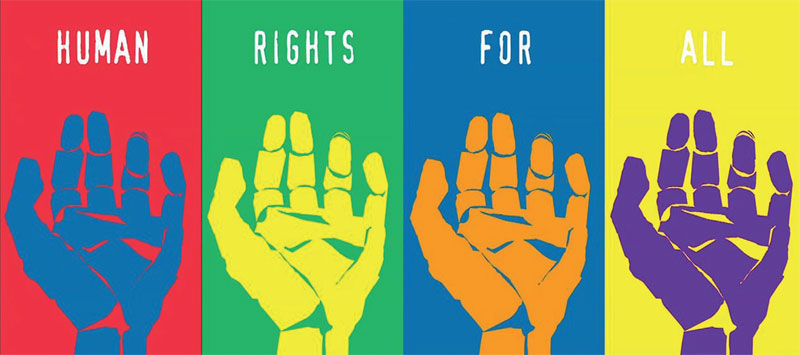International Human Rights Day

Human Rights Day is observed every year on 10 December – the day the United Nations General Assembly adopted, in 1948, the Universal Declaration of Human Rights. This year, Human Rights Day kicks off a year-long campaign to mark the upcoming 70th anniversary o f the Universal Declaration of Human Rights, a milestone document that proclaimed the inalienable rights which everyone is inherently entitled to as a human being -- regardless of race, colour, religion, sex, language, political or other opinion, national or social origin, property, birth or other status. It is the most translated document in the world, available in more than 500 languages.
International Protection of Human Rights
It was after the Second World War that people realized the tragedy befallen on them and started to make amends. The United Nations was established to keep peace, but later made it a point to protect human rights. Human rights are the basic rights and freedoms to which all humans are considered entitled: the right to life, liberty, freedom of thought and expression, and equal treatment before the law, among others. Various “basic” rights that cannot be violated under any circumstances are set forth in international human rights documents such as the Universal Declaration of Human Rights, the International Covenant on Economic, Social and Cultural Rights, and the International Covenant on Civil and Political Rights. The rights established by these documents include economic, social, cultural, political and civil rights. Many conflicts are sparked by a failure to protect human rights, and the trauma that results from severe human rights violations often leads to new human rights violations. As conflict intensifies, hatred accumulates and makes restoration of peace more difficult. In order to stop this cycle of violence, states must institute policies aimed at human rights protection. Respect for human rights has therefore become an integral part of international law and foreign policy. The specific goal of expanding such rights is to increase safeguards for the dignity of the person. How protecting the dignity and rights of man came about after the tragic wars fought between nations.
World War I
The war fought between July 28, 1914, and November 11, 1918, was known at the time as the Great War, the War to End War, and (in the United States) the European War. Only when the world went to war again in the 1930s and ’40s did the earlier conflict become known as the First World War. Its casualty totals were unprecedented, soaring into the millions. World War I is known for the extensive system of trenches from which men of both sides fought. Lethal new technologies were unleashed, and for the first time a major war was fought not only on land and on sea but below the sea and in the skies as well. The two sides were known as the Allies or Entente—consisting primarily of France, Great Britain, Italy, Russia, and later the United States—and the Central Powers, primarily comprised of Austria-Hungary (the Habsburg Empire), Germany, and the Ottoman Empire (Turkey). A number of smaller nations aligned themselves with one side or the other. In the Pacific Japan, seeing a chance to seize German colonies, threw in with the Allies. The Allies were the victors, as the entry of the United States into the war in 1917 added an additional weight of men and materiel the Central Powers could not hope to match. The war resulted in a dramatically changed geo-political landscape, including the destruction of three empires: Austro-Hungarian, Ottoman and Russian. New borders were drawn at its conclusion and resentments, especially on the part of Germany, left festering in Europe. Ironically, decisions made after the fighting ceased led the War to End War to be a significant cause of the Second World War. As John Keegan wrote in The First World War (Alfred A. Knopf, 1999), “The First World War was a tragic and unnecessary conflict … the train of events that led to its outbreak might have been broken at any point during the five weeks of crisis that preceded the first clash of arms, had prudence or common goodwill found a voice.”
League of Nations
The League of Nations came into being after the end of World War One. The League of Nation’s task was simple – to ensure that war never broke out again. After the turmoil caused by the Versailles Treaty, many looked to the League to bring stability to the world. America entered World War One in 1917. The country as a whole and the president – Woodrow Wilson in particular – was horrified by the slaughter that had taken place in what was meant to be a civilised part of the world. The only way to avoid a repetition of such a disaster was to create an international body whose sole purpose was to maintain world peace and which would sort out international disputes as and when they occurred. This would be the task of the League of Nations. Failure of League of Nations led to the Second World War (World War II).
World War II
The carnage of World War II was unprecedented and brought the world closest to the term “total warfare.” On average 27,000 people were killed each day between September 1, 1939, until the formal sur render of Japan on September 2, 1945. Western technological advances had turned upon itself, bringing about the most destructive war in human history. The primary combatants were the Axis nations of Nazi Germany, Fascist Italy, Imperial Japan, a n d t h e A l l i e d nations, Great Britain (and its Commonwealth nations), the Soviet Union, and the United States. Seven days after the suicide of Adolf Hitler, Germany unconditionally surrendered on May 7, 1945. The Japanese would go on to fight for nearly four more months until their surrender on September 2, which was brought on by the U.S. dropping atomic bombs on the Japanese towns of Nagasaki and Hiroshima. Despite winning the war, Britain largely lost much of its empire, which was outlined in the basis of the Atlantic Charter. The war precipitated the revival of the U.S. economy, and by the war’s end, the nation would have a gross national product that was nearly greater than all the Allied and Axis powers combined. The USA and USSR emerged from World War II as global superpowers. The fundamentally disparate, one-time allies became engaged in what was to be called the Cold War, which dominated world politics for the latter half of the 20th century.
United Nations
The United Nations was born of perceived necessity, as a means of better arbitrating international conflict and negotiating peace than was provided for by the old League of Nations. The growing Second World War became the real impetus for the United States, Britain, and the Soviet Union to begin formulating the original U.N. Declaration, signed by 26 nations in January 1942, as a formal act of opposition to Germany, Italy, and Japan, the Axis Powers. The principles of the U.N. Charter were first formulated at the San Francisco Conference, which convened on April 25, 1945. It was presided over by President Franklin Roosevelt, British Prime Minister Winston Churchill, and Soviet Premier Joseph Stalin, and attended by representatives of 50 nations, including 9 continental European states, 21 North, Central, and South American republics, 7 Middle Easter n states, 5 British Commonwealth nations, 2 Soviet republics (in addition to the USSR itself), 2 East Asian nations, and 3 African states. The conference laid out a structure for a new international organization that was to “save succeeding generations from the scourge of war,…to reaffirm faith in fundamental human rights,…to establish conditions under which justice and respect for the obligations arising from treaties and other sources of international law can be maintained, and to promote social progress and better standards of life in larger freedom.”
Devuni Goonewardene









































.jpg)
.jpg)

.jpg)
.jpg)
.jpg)
